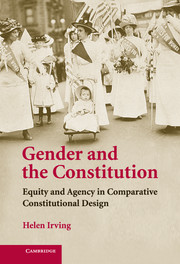4 - Citizenship
Published online by Cambridge University Press: 08 December 2009
Summary
To be a citizen is to be a member of the political community. To acquire and retain citizenship in one's own right, and to be able to transmit that citizenship to one's children, are central to such membership. For the individual, much rests on this. Citizenship can give rise to legal entitlements; it can serve as a source of security and stability, and even a type of dignity. It entails, essentially, the recognition of a person's capacity to be part of the public sphere and to take part in the public decisions that shape the course of one's life – to be counted in the constitutional community.
Until the nineteenth century, women were denied the personal citizenship that was available to similarly situated men. Citizenship was far from universal. Not all men were entitled to the status or entitlements of citizens, but some men at least were. No woman was. Women were unable either to hold citizenship outright (they were excluded from the class of persons defined as citizens) or, where they came within the definition of citizens, they were commonly incapable of acquiring, retaining, or transmitting their citizenship in their own right. Women's citizenship, to the extent that it was recognized, was derivative, derived from that of their fathers or husbands. The maturity that is conveyed in the very concept of citizenship – the full, adult capacity to make and take part in decisions – was denied to women. What we recognize today as the entitlements of citizenship were withheld.
- Type
- Chapter
- Information
- Gender and the ConstitutionEquity and Agency in Comparative Constitutional Design, pp. 90 - 108Publisher: Cambridge University PressPrint publication year: 2008

